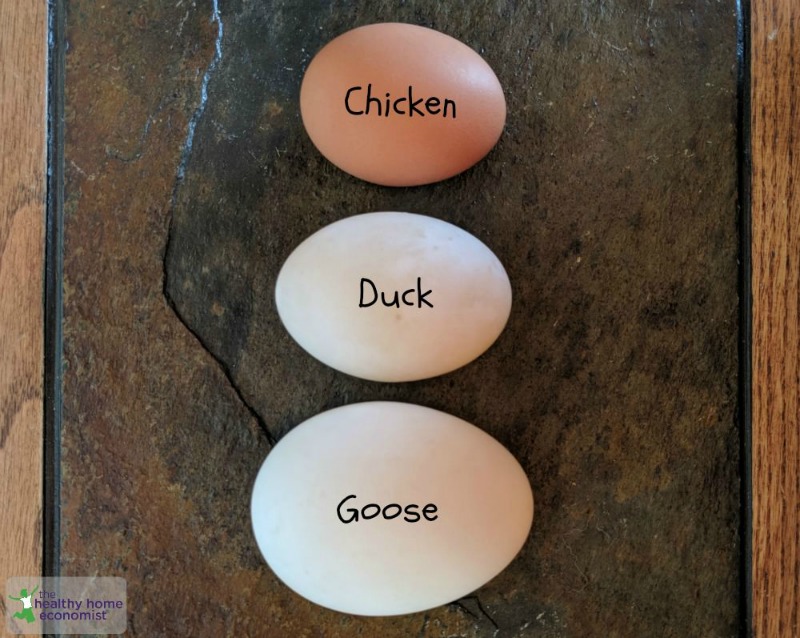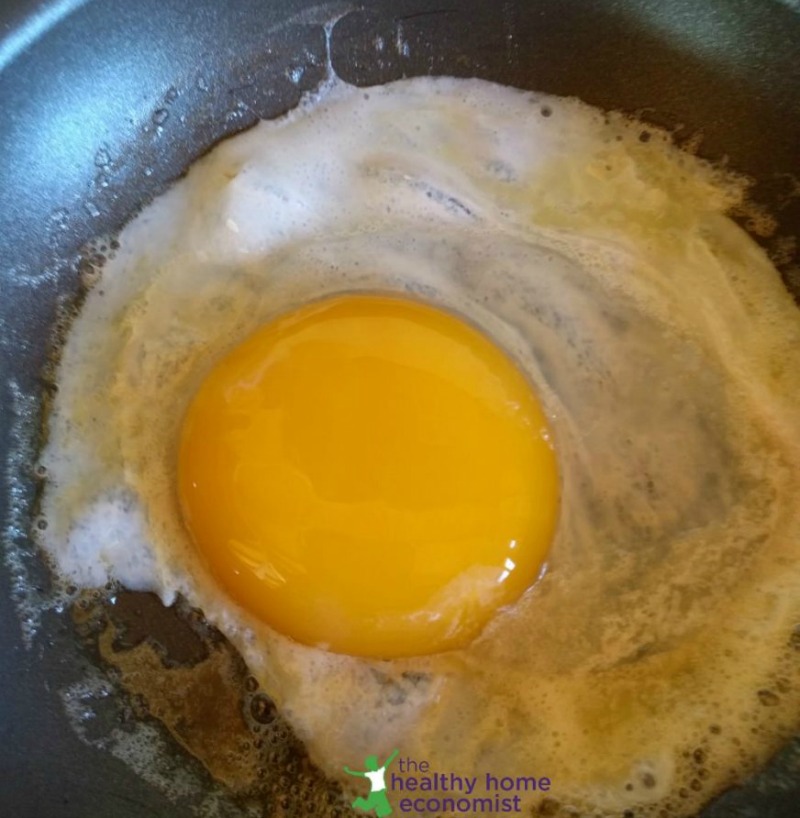Goose eggs are incredibly nutritious and beneficial to health even when compared to pastured chicken or duck eggs. Here’s why to try them, how to use in cooking and where to buy when in season!
I tasted goose eggs for the very first time while on vacation recently in Colorado. Like duck eggs, they are not a common food in the American diet.
However, they are becoming more widely available as an increasing number of people opt to raise small flocks of backyard chickens and other egg-laying birds.
Why would someone choose to raise geese instead of chickens or ducks?
One reason is that several breeds of geese make excellent watchdogs! When fully grown, they will honk very loudly at approaching intruders and fearlessly chase them away if necessary. Like swans, an irate goose can be quite fearsome to encounter. I say this from personal experience!
An animal that provides both food and protection can be an attractive choice for homesteading.
Given how uncommon it is to find goose eggs commercially, you can imagine my excitement when I spied a few tucked away in a small box at a quaint little healthfood store near Pikes Peak. My husband and I were staying nearby for the week (no cell service!) to unplug, relax and have some outdoor fun.
Hiking, in particular, really seems to stoke the appetite (at least for me), so lots of fresh eggs were on the menu for the week. Without a doubt, they are the number one stamina food to eat for breakfast especially if a rigorous outdoor adventure is on tap for the day.
Goose Eggs versus Chicken and Duck Eggs
Each goose egg that I purchased was sold individually rather than in a carton. They cost $1.99 each and were hard as a rock when you tried to crack them, leading me to think they might have been wild eggs from the Canadian geese living in the area.
Eggs from geese are bigger than even the largest chicken eggs. They are also considerably larger than duck eggs.
A duck egg is typically 50% bigger than a jumbo chicken egg. A goose egg is even bigger at twice the size! The picture above shows you the difference visually.
The large size means that you can use just one goose egg for every two chicken eggs called for in recipes. Believe it or not, a single goose egg will make a nice sized omelet.
As you can see from the second picture below, a goose egg yolk is quite a bit larger in proportion to the egg white than duck or chicken eggs. The yolk is enormous in fact!
Now, don’t give me a hard time about the Teflon pan in the picture. I certainly don’t ever use Teflon at home. However, we were staying at an Airbnb, so I was using the only cookware that was available!
What Do Goose Eggs Taste Like?
Goose eggs are incredibly rich in flavor. To be more precise, they taste very much like a double yolk chicken egg.
Other than being richer in flavor, there isn’t any taste difference. If your family loves chicken or duck eggs, they will love goose eggs too.
Goose Egg Nutrition
Given the amazingly large size of the yolk, the amount of healthy fats in a goose egg is significant. The chart below compares the nutritional information between goose, duck and chicken eggs.
Notice that calorie for calorie, goose eggs are the most nutritious of the three. This is because the nutrient-rich yolk is so much larger in proportion to the white than both duck and chicken eggs.
| Goose Egg | Duck Egg | Chicken Egg | |
| Calories | 266 | 130 | 72 |
| Carbs | 2 g | 1 g | <1 g |
| Protein | 19.5 g | 9 g | 6 g |
| Total Fat | 20 g | 9.6 g | 4.8 g |
| Saturated | 5 g | 2.6 g | 1.6 g |
| Cholesterol | 1227 mg | 619 mg | 213 mg |
| Iron | 29%DV | 24%DV | 5%DV |
| Calcium | 9%DV | 5%DV | 2.6%DV |
| Vitamin A | 19%DV | 18%DV | 6%DV |
| Choline | 70%DV | 34%DV | 23%DV |
| Selenium | 73%DV | 46%DV | 25%DV |
| Vitamin B12 | 312%DV | 158%DV | 7%DV |
Duck vs Chicken vs Goose Egg Nutrients
Those educated in the principles of traditional diet know that eggs are one of the most nutritious foods on the planet especially when from wild or pastured birds.
However, if you have the luxury of choosing which eggs to eat as I did in Colorado, choose the goose eggs at least once in a while. Eating them frequently would be even better. Not only does this add variety to the diet, but it boosts nutrition considerably. As noted earlier, the large yolk and small white in goose eggs are the reason why.
Even when adjusting for the obvious visual size difference, the total amount of fat in a goose egg is much higher than in a duck or chicken egg.
Of course, if you are an egg-white omelet person who avoids fat and misguidedly believes that natural cholesterol is deadly, then the prospect of eating a goose egg is not an exciting thought.
One goose egg contains 1227 mg of cholesterol – the equivalent of nearly 6 chicken eggs!
Those familiar with current nutritional research realize the cholesterol myths still running rampant in some nutritional circles. The reality is that natural cholesterol is necessary for a healthy body and crucial for optimal mental health. You definitely want to avoid oxidized cholesterol in processed foods, but not the natural cholesterol in egg yolks!
Avoiding egg yolks is — so last century!
Where to Find
If you live and shop in an urban area, the chances of finding eggs from geese locally are likely quite slim.
You can try buying them online. Lots of listings appeared when I did a basic search. But, they are very expensive and only available during the spring months.
Your best bet is to look for them when in season while shopping at farmers’ markets or small health food stores in rural areas where geese are native and/or housing restrictions don’t prohibit loud, aggressive birds living in the backyard. This way, you may get lucky and only pay $6 for three beauties like I did!
Dishes Made with Goose Eggs
Looking for recipes using goose eggs? Check out these breakfast egg recipes for a morning boost. Remember, you need only half as many eggs due to their large size!
And, if you’re like me and enjoy eggs later in the day too, try these egg recipes for lunch and egg recipes for dinner.









So nice to see you talking about this. I raise chickens, ducks, geese and peacocks. I eat the eggs all the time. If the wild taste is too strong for someone, I suggest the mix the duck and chicken eggs – it tames the wild flavor people mention. Also, try using duck or goose eggs when make cornbread or baking a cake. Water Fowl eggs have a much thicker white – due to the fact that most water fowl lay eggs in winter when it is colder. The thicker white protects the yolk from freezing. We benefit in cooking with duck or goose eggs because the thick whites make the cake or cornbread rise even higher than usual and are much moister. My husband loves my cornbread !!
I also found duck eggs, when fried or scrambled, had a stronger flavor profile than the chicken eggs raised on the same pasture. Supposedly they are wonderful in place of chicken eggs in some baked goods. I have read 1 duck egg can substitute for 2 chicken eggs.
I have pasture raised geese and I agree with you.
I have a pet goose and her egg shells are very hard too…it takes some effort to crack the egg….I always felt the goose eggs had more of a “wild” flavor, even though all my birds free range. Geese eat a lot more grass.
My late parents tasted PEACOCK eggs and found them delicious – I wasn’t present when they were on offer. Have you come across them?
I haven’t seen them anywhere, but if I do, I will be sure to try them! We do have a lot of peacocks in our area and one even adopted our home for about 6 months before moving on during mating season.
I noticed that both the duck and goose egg contain carbs. No, I don’t avoid carbs, but I’m wondering why there would be any carbs in a duck or goose egg. Just curious…
If you look at the nutritional chart above, there is an insignificant amount of carbs in any type of egg.
“………leading me to think they might have been wild eggs from the Canadian geese living in the area.” Let’s hope not! Canada Geese eggs are protected under the Migratory Bird Act and possessing one, much less eating one, would lead to a hefty fine! The only goose eggs legal to eat in the US are from domesticated geese. You can purchase wild breeds of geese and ducks from specially licensed breeders, but I’d be surprised to find someone selling their eggs as they usually only lay one batch of eggs per year, unlike domesticated breeds which can lay year-round.
Thank you Sarah for sharing your knowledge with us
Very nice! What state do you live in? Do you raise your own geese or buy the goose eggs from a health food store?
I am vegetarian, and vegetarians have a lot of trouble getting enough B12 without supplements. I eat lots of goose eggs instead because they are so high in it!